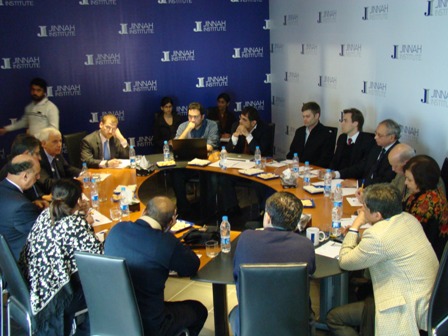Round Table
No Substitute for Political Agreement – Amb. Larocco
Date: December 19, 2012
December 19 2012, ISLAMABAD – There is no substitute for a political agreement in Afghanistan, and military action alone is not enough to bring an end to the conflict, said James Larocco, director of the Near East South Asia Center for Strategic Studies in Washington and a former ambassador, at a roundtable discussion at the Jinnah Institute in Islamabad on Wednesday.
“Militaries don’t solve the problems. Essentially you have to address political issues, and you have to address economic issues. Without addressing those two, militaries accomplish nothing,” said Amb. Larocco, adding that other countries in the region, especially Pakistan, need to be comfortable and feel secure with the political and economic arrangements in Afghanistan.
The Jinnah Institute discussion was attended by senior journalists, researchers, former and current Pakistani officials and members of civil society. The roundtable focused on the state of Afghanistan, U.S.-Pakistan relations and the way forward on resolving the issues that have plagued them.
Participants agreed that greater people-to-people contacts were necessary for strengthening the relationship, so that both countries better understand each other. Raza Rumi, director of policy and programmes at the Jinnah Institute, stressed the need for improving ties not just between governments and militaries, but also between institutions and people.
 Amb. Larocco said that Pakistan and the United States both know what they want to achieve in terms of aiding the peace process in Afghanistan, but do not yet know how to get there. “We both know where we want to go and where we want to be. But it’s difficult to define clearly for either of us how to get there,” he said.
Amb. Larocco said that Pakistan and the United States both know what they want to achieve in terms of aiding the peace process in Afghanistan, but do not yet know how to get there. “We both know where we want to go and where we want to be. But it’s difficult to define clearly for either of us how to get there,” he said.
The lively discussion also focused on the trust deficit between the United States and Pakistan, and how both countries had no choice but to work together for goals, especially for regional stability, and that both countries needed to deepen their ties, which are currently “episodic” in nature.
Participants in the discussion included former Pakistan ambassador Sarwar Naqvi, Irfan Malik of the Washington D.C.-based USPAK Foundation, senior journalists Ejaz Haider, Mariana Baabar and Farrukh Pitafi, Arshi Saleem Hashmi from the National Defence University, and Lt. Gen. (retd) Talat Masood.
The Jinnah Institute is a non-profit public policy organization based in Pakistan. It functions as a think tank, advocacy group and public outreach organization independent of the government. The institute seeks to promote knowledge-based policy making for strengthening democratic institutions and building public stakes in human and national security discourse. It remains committed to investing in policies that promote fundamental rights, tolerance and pluralism.
Coverage: Daily Times, Dawn, One Pakistan, Express Tribune

